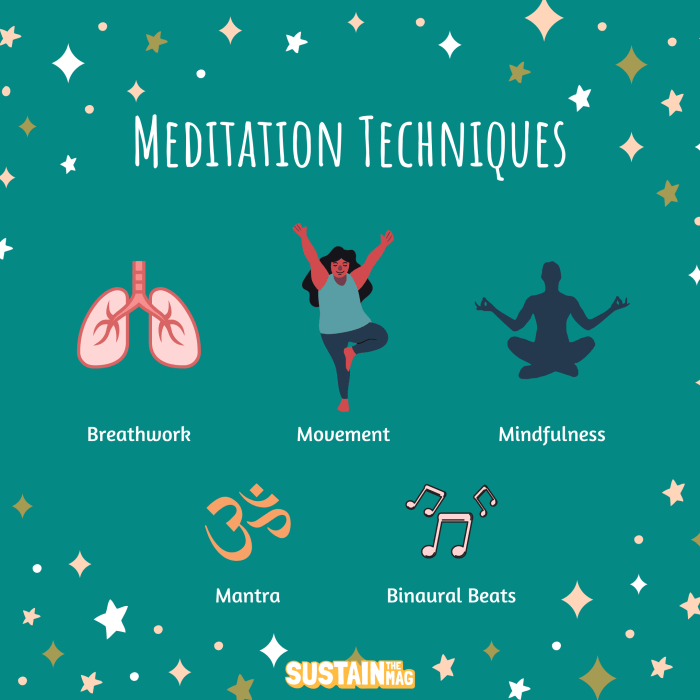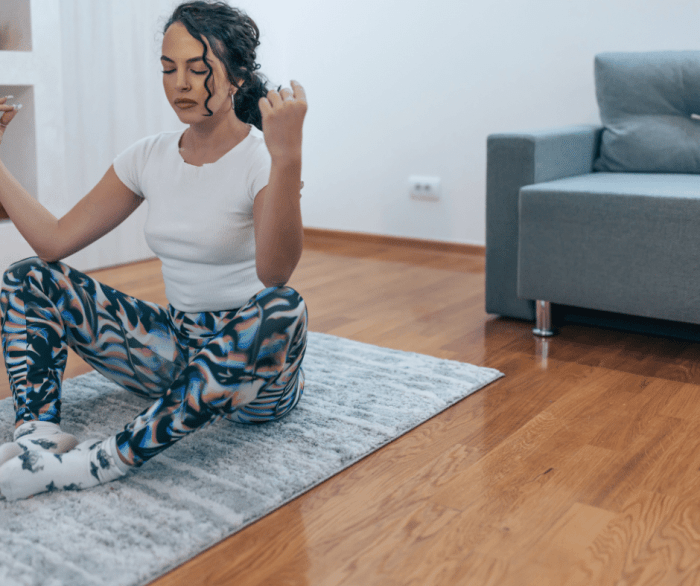12 Ways to Use Meditation for Mental Clarity opens the door to a world of focus and peace, where your mind can thrive and excel. Dive into the transformative power of meditation with these practical tips and insights.
Explore the different meditation practices, techniques, and tools that can sharpen your mental acuity and bring clarity to your thoughts.
Introduction to Meditation for Mental Clarity
When we talk about mental clarity in the context of meditation, we refer to the state of having a clear and focused mind, free from distractions and negative thoughts. It allows us to think more clearly, make better decisions, and feel a sense of inner peace.
Meditation has numerous benefits when it comes to achieving mental clarity. It helps reduce stress, anxiety, and overwhelm by calming the mind and promoting relaxation. By practicing meditation regularly, individuals can improve their focus, memory, and cognitive function.
Improving Focus
- Meditation helps train the mind to stay present and focused on the task at hand, enhancing concentration levels.
- By practicing mindfulness meditation, individuals can learn to acknowledge distracting thoughts without getting caught up in them, leading to improved focus.
- Regular meditation sessions can increase attention span and productivity by reducing mental clutter and promoting mental clarity.
Reducing Stress
- Meditation techniques such as deep breathing and body scan help activate the body’s relaxation response, reducing stress levels.
- Mindfulness meditation teaches individuals to observe their thoughts and emotions without judgment, leading to a calmer and more balanced state of mind.
- By incorporating meditation into daily routines, individuals can build resilience to stress and experience greater mental clarity in challenging situations.
Types of Meditation Practices
When it comes to achieving mental clarity through meditation, there are various types of meditation practices that can be beneficial. Each type works in a unique way to help calm the mind and improve focus, ultimately leading to mental clarity.
Mindfulness Meditation
- Mindfulness meditation involves paying attention to the present moment without judgment.
- By focusing on your breath or bodily sensations, you can become more aware of your thoughts and emotions.
- This type of meditation helps increase self-awareness, reduce stress, and improve overall mental well-being.
Transcendental Meditation
- Transcendental meditation involves silently repeating a mantra to achieve a state of relaxed awareness.
- It aims to transcend or go beyond the surface level of thought to reach a state of pure consciousness.
- This practice is known to reduce anxiety, increase creativity, and promote a sense of inner peace.
Comparing mindfulness meditation and transcendental meditation, both can be effective in enhancing mental clarity. While mindfulness meditation focuses on being present and aware of thoughts, emotions, and sensations, transcendental meditation aims to transcend these mental fluctuations to reach a state of pure consciousness.
Meditation Techniques for Mental Clarity: 12 Ways To Use Meditation For Mental Clarity

When it comes to achieving mental clarity through meditation, there are specific techniques that can be particularly effective. Mindfulness meditation, in particular, has been shown to help individuals improve their focus, reduce stress, and enhance overall mental well-being. Here are some step-by-step instructions for beginners on how to practice mindfulness meditation:
Mindfulness Meditation for Beginners
To begin your mindfulness meditation practice, find a quiet and comfortable space where you can sit or lie down without distractions. Close your eyes and focus on your breath, paying attention to the sensation of each inhale and exhale.
- Start by taking deep breaths in through your nose, allowing your lungs to fill with air.
- Exhale slowly through your mouth, releasing any tension or stress with each breath.
- Continue to focus on your breathing, letting go of any thoughts that arise and returning your attention to the present moment.
- Practice this for a few minutes each day, gradually increasing the duration as you become more comfortable with the practice.
Breathing Techniques for Mental Clarity
One of the key components of mindfulness meditation is using breathing techniques to enhance mental clarity. By focusing on the breath, individuals can calm their minds, reduce anxiety, and improve their overall cognitive function. Here are some common breathing techniques used in meditation:
- Diaphragmatic Breathing: Also known as belly breathing, this technique involves breathing deeply into the diaphragm, allowing the abdomen to expand with each inhale and contract with each exhale.
- Equal Breathing: In this technique, individuals strive to inhale and exhale for an equal count, such as inhaling for a count of four and exhaling for a count of four. This helps to balance the breath and calm the mind.
- Box Breathing: Box breathing involves inhaling, holding the breath, exhaling, and holding the breath again, each for a count of four. This rhythmic pattern can help individuals focus and find clarity in their thoughts.
Maintaining Focus during Meditation
Staying focused during meditation sessions is essential for achieving optimal mental clarity. Here are some tips to help you maintain your focus:
- Avoid distractions by choosing a quiet and peaceful environment for meditation.
- Set a timer to keep track of your meditation session and prevent your mind from wandering.
- Use a mantra or phrase to repeat silently to yourself, helping to anchor your attention to the present moment.
- If your mind starts to wander, gently guide your focus back to your breath or chosen point of concentration without judgment.
Incorporating Meditation into Daily Routine
As we navigate through our busy daily lives, finding time to meditate can seem like a daunting task. However, incorporating short meditation sessions into your daily routine can have a profound impact on your mental clarity and overall well-being.
Integrating Short Meditation Sessions
One effective way to integrate meditation into your daily routine is to start small. Begin by setting aside just 5-10 minutes each day for meditation. This can be done first thing in the morning, during a lunch break, or before bed.
- Create reminders on your phone or calendar to carve out time for meditation.
- Find a quiet and comfortable space where you can relax and focus on your breath.
- Experiment with different times of the day to see when you feel most centered and focused.
Creating a Meditation Space at Home
Having a dedicated meditation space at home can enhance your practice and promote mental clarity. Consider the following tips:
- Choose a quiet area free from distractions, such as clutter or noise.
- Add elements that promote relaxation, such as candles, cushions, or essential oils.
- Personalize your space with items that bring you joy and peace, creating a tranquil environment for meditation.
Importance of Consistency
Consistency is key when it comes to reaping the long-term benefits of meditation for mental clarity. By establishing a regular meditation practice, you can cultivate a sense of inner peace and focus that extends beyond individual sessions.
Consistency in meditation practice allows you to build resilience to stress and enhance cognitive function over time.
Make a commitment to meditate daily, even if it’s just for a few minutes, to experience the transformative power of this ancient practice.
Meditation and Emotional Well-being
Meditation plays a crucial role in promoting emotional well-being by helping individuals manage their emotions effectively and achieve emotional balance. Through consistent practice, meditation can provide a sense of calmness, clarity, and inner peace that can positively impact one’s emotional health.
The Impact of Meditation on Emotional Well-being
- Meditation helps individuals cultivate self-awareness and emotional regulation, enabling them to respond to challenging situations with greater composure and resilience.
- By reducing stress and anxiety levels, meditation can alleviate emotional distress and promote a sense of emotional stability and well-being.
- Regular meditation practice can enhance empathy, compassion, and emotional intelligence, leading to improved relationships and social interactions.
The Connection Between Emotional Health and Mental Clarity
- Emotional health and mental clarity are closely intertwined, as unmanaged emotions can cloud the mind and hinder cognitive function.
- Through meditation, individuals can release pent-up emotions, clear mental blocks, and enhance focus and concentration, ultimately leading to improved mental clarity.
- By fostering a positive emotional state, meditation can create a conducive environment for mental clarity to thrive, enabling individuals to make sound decisions and think more clearly.
Meditative Movements for Mental Clarity
Meditative movements, such as yoga or Tai Chi, have been known to enhance mental clarity by combining physical activity with mindfulness practices. These movements help calm the mind, reduce stress, and improve focus.
Yoga Poses for Mental Focus
- Mountain Pose (Tadasana): This pose helps improve posture and concentration by grounding the body and mind.
- Tree Pose (Vrikshasana): Balancing poses like this one require focus and can help clear the mind of distractions.
- Child’s Pose (Balasana): A resting pose that allows for introspection and relaxation, promoting mental clarity.
Tai Chi Movements for Cognitive Function
- Cloud Hands: This gentle movement helps improve coordination and mental focus through slow, deliberate motions.
- Horse Stance: Holding this pose can strengthen mental discipline and concentration while improving balance.
- Wave Hands Like Clouds: Fluid movements in this sequence stimulate the mind and enhance cognitive function.
Meditation Retreats and Workshops
Embarking on a meditation retreat or participating in a workshop can offer a profound and immersive experience for individuals seeking to enhance their mental clarity. These structured programs provide a dedicated space and time for individuals to deepen their meditation practice and gain valuable insights into their inner selves.
Benefits of Attending Meditation Retreats and Workshops
- Immersive Environment: Retreats and workshops offer a distraction-free environment conducive to focused meditation practice, allowing participants to delve deeper into their inner thoughts and emotions.
- Guided Practice: Experienced instructors lead sessions, providing guidance and feedback to help participants refine their meditation techniques and deepen their practice.
- Community Support: Being surrounded by like-minded individuals on a similar journey can foster a sense of community and support, enhancing the overall experience.
- Deep Relaxation: Retreats often include practices such as yoga, mindfulness walks, and silent reflection, promoting relaxation and stress relief.
What to Expect from Meditation Retreats and Workshops, 12 Ways to Use Meditation for Mental Clarity
- Intensive Meditation Practice: Participants can expect to engage in multiple meditation sessions throughout the day, immersing themselves in the practice to cultivate mental clarity.
- Self-Discovery: Retreats often include activities such as journaling, group discussions, and mindfulness exercises that encourage self-reflection and personal growth.
- Renewed Focus: The structured nature of retreats and workshops can help participants recenter their focus and gain clarity on their goals and priorities.
Tips for Choosing the Right Meditation Retreat or Workshop
- Research the Instructors: Look for retreats led by experienced and reputable meditation teachers who align with your goals and values.
- Consider the Duration: Decide whether you prefer a weekend retreat, a week-long program, or a more extended immersive experience based on your availability and comfort level.
- Read Reviews: Check testimonials and reviews from past participants to gauge the quality and effectiveness of the retreat or workshop.
- Location and Setting: Choose a retreat location that resonates with you, whether it’s a serene natural environment or a peaceful meditation center.
Mindful Eating and Mental Clarity
Mindful eating is a practice that involves paying full attention to the experience of eating and drinking, both in terms of the food itself and the act of consuming it. This practice has been linked to improved mental clarity as it helps individuals become more aware of their eating habits, leading to better focus and cognitive function.
Guidelines for Practicing Mindful Eating
- Avoid distractions while eating, such as watching TV or using electronic devices.
- Take time to appreciate the appearance, smell, and taste of the food.
- Chew slowly and savor each bite, paying attention to the texture and flavors.
- Listen to your body’s hunger and fullness cues to avoid overeating.
- Express gratitude for the meal and the nourishment it provides.
Recipes for Promoting Mental Clarity
- Quinoa Salad with Avocado and Lemon Dressing: A nutrient-dense meal packed with protein and healthy fats to support brain function.
- Wild Salmon with Roasted Vegetables: Rich in omega-3 fatty acids, this dish helps improve focus and concentration.
- Green Smoothie Bowl with Berries and Almonds: A refreshing and antioxidant-rich breakfast option for mental clarity.
- Turmeric Lentil Soup: Contains anti-inflammatory properties that support brain health and cognitive function.
Meditation Apps and Tools for Mental Clarity

In today’s fast-paced world, where stress and distractions are rampant, meditation apps and tools have become invaluable resources for achieving mental clarity and focus. These apps are designed to help users cultivate mindfulness, reduce stress, and improve overall well-being.
Popular Meditation Apps and Tools
- Headspace: Known for its guided meditation sessions and mindfulness exercises, Headspace offers a wide range of programs tailored to specific needs, such as stress reduction, better sleep, and improved focus.
- Calm: With soothing sounds, relaxing music, and guided meditation sessions, Calm helps users unwind, reduce anxiety, and enhance mental clarity.
- Insight Timer: This app offers a diverse selection of guided meditations, music tracks, and meditation timers to support users in their mindfulness practice.
Features of Meditation Apps for Mental Clarity
- Guided Meditations: Many apps provide step-by-step guidance from experienced meditation teachers to help users focus their minds and cultivate mindfulness.
- Breathing Exercises: Apps often include breathing techniques that can be used to calm the mind, reduce stress, and enhance mental clarity.
- Progress Tracking: Some apps offer features to track meditation progress, set goals, and provide insights into users’ mindfulness journey.
User Reviews and Testimonials
“Using meditation apps like Headspace and Calm has completely transformed my daily routine. I feel more focused, relaxed, and clear-headed throughout the day.” – Sarah
“Insight Timer has been a game-changer for me. I never realized how much of an impact meditation could have on my mental clarity until I started using this app regularly.” – John
Meditation and Sleep Quality

Meditation has been shown to have a positive impact on sleep quality, which is crucial for maintaining mental clarity. By incorporating meditation into your bedtime routine, you can relax your mind and body, leading to a more restful and rejuvenating sleep. This, in turn, can help improve focus, concentration, and overall cognitive function the next day.
Bedtime Meditation Techniques
- Body Scan Meditation: Start by focusing on each part of your body, from head to toe, relaxing and releasing tension as you go. This can help prepare your body for sleep.
- Deep Breathing: Take slow, deep breaths to calm the mind and activate the body’s relaxation response. This can help reduce racing thoughts and promote a sense of calm.
- Visualization: Imagine a peaceful and serene place, such as a beach or forest, and immerse yourself in the sights, sounds, and sensations. This can help distract the mind from worries and stress.
Pre-Sleep Meditation Routine Tips
- Set a Regular Bedtime: Establish a consistent sleep schedule to regulate your body’s internal clock and improve sleep quality.
- Avoid Screens: Limit exposure to electronic devices before bed, as the blue light emitted can disrupt the production of melatonin, a hormone that regulates sleep.
- Create a Relaxing Environment: Dim the lights, play calming music, or use essential oils like lavender to create a tranquil atmosphere conducive to meditation and sleep.
Meditation and Cognitive Performance

Meditation has been shown to have a positive impact on cognitive performance, enhancing mental clarity, memory, concentration, and problem-solving skills. Research studies have highlighted the benefits of regular meditation practice on brain functions and cognitive abilities.
Impact of Meditation on Cognitive Performance
- Meditation helps in improving attention and focus by training the mind to stay present and avoid distractions.
- Regular meditation practice has been linked to enhanced memory retention and recall, leading to better cognitive functioning.
- Studies suggest that meditation can increase cognitive flexibility, allowing individuals to adapt to new situations and think creatively.
Cognitive Exercises to Combine with Meditation
- Brain Teasers: Engaging in puzzles, riddles, and brain games can complement meditation by challenging cognitive abilities and problem-solving skills.
- Mindfulness-Based Cognitive Therapy: Combining mindfulness techniques with cognitive exercises can help in managing negative thought patterns and improving cognitive performance.
- Visualization Techniques: Practicing visualization exercises during meditation can enhance mental imagery and stimulate cognitive functions.
Personal Experiences with Meditation for Mental Clarity

Meditation has the power to transform our mental clarity and overall well-being. It is through personal experiences and success stories that we truly understand the profound impact of meditation on our lives. By sharing tips, challenges faced, and lessons learned in their meditation journey, individuals can inspire and support one another in their quest for mental clarity. Let’s explore some inspirational stories of those who have reaped the benefits of regular meditation practice.
Transformative Journey of Sarah
Sarah, a busy professional struggling with stress and anxiety, decided to incorporate meditation into her daily routine. Initially skeptical, she found solace in guided meditation sessions and mindfulness practices. Through consistent effort, Sarah noticed a significant improvement in her focus, emotional well-being, and decision-making abilities. Meditation not only helped her cope with work pressures but also enhanced her overall quality of life.
Overcoming Obstacles with Meditation: John’s Story
John, a college student battling with self-doubt and academic pressure, turned to meditation as a coping mechanism. Despite facing initial resistance and distractions, he persisted in his practice and gradually experienced a sense of calm and mental clarity. Through meditation, John learned to manage his thoughts, regulate his emotions, and stay grounded amidst challenges. His journey is a testament to the transformative power of meditation in overcoming obstacles.
The Healing Journey of Maria
Maria, a trauma survivor struggling with PTSD, found refuge in meditation as a form of healing and self-discovery. Through mindful breathing exercises and visualization techniques, she learned to process her emotions, release past traumas, and cultivate inner peace. Meditation became a source of strength and resilience for Maria, allowing her to navigate life’s complexities with a renewed sense of clarity and purpose.
Final Summary
Embark on a journey towards enhanced mental clarity and emotional well-being with the profound impact of meditation. Discover the power within you to achieve a sharper mind and a balanced spirit through these 12 transformative ways.